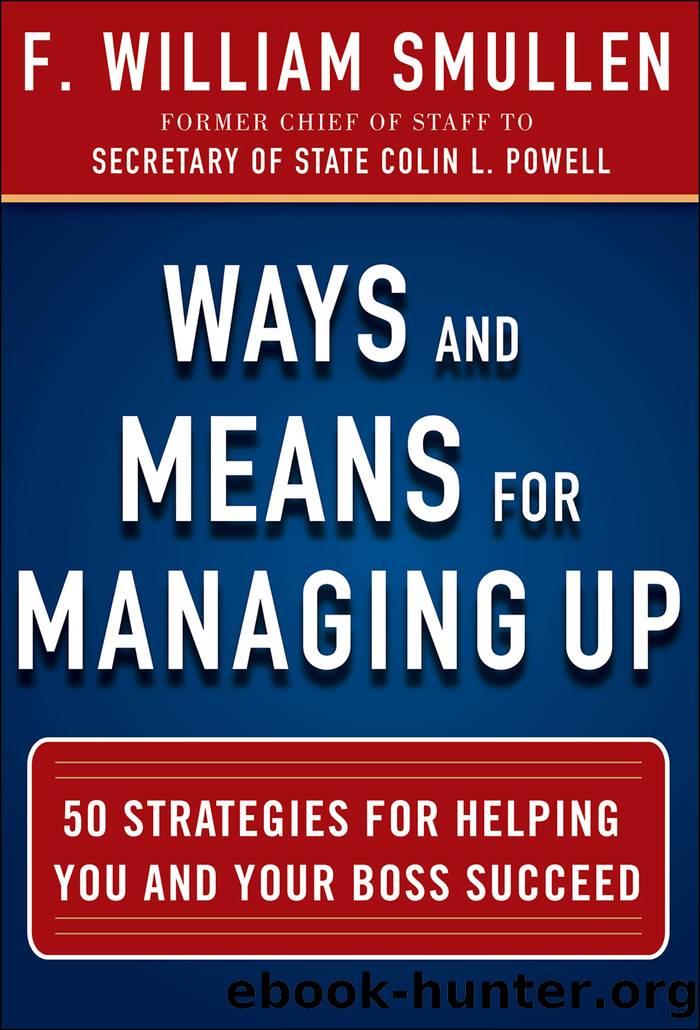Ways and Means for Managing Up by F. William Smullen

Author:F. William Smullen
Language: eng
Format: epub
Publisher: McGraw Hill LLC
Published: 2014-09-15T00:00:00+00:00
29
Be a Strategic Asset
The boss doesnât always know that he or she needs you. He or she may never even ask or think about asking for your help. That doesnât mean you shouldnât provide it as necessary.
If your boss has monumental decisions to make, he or she shouldnât stand alone in that regard. The boss need not do it by herself or himself. Think of yourself as a strategic asset waiting to happen.
If youâre waiting to be asked, youâre not thinking beyond the moment for the boss, who could probably use your counsel more than he or she thinks. To provide effective counsel you need to be thinking and planning beyond the moment for the things that lie ahead, anticipated or not.
A good way to start is by making an honest appraisal of the business landscape today and what itâs likely to look like in the years to come. Understanding what corporate interests are at stake in regard to the decisions you make is key. Knowing your business purposes and the proposed actions for achieving them is also important. Determining the costs, the resources available, and the desired outcomes of those actions is fundamental.
Gubernare is a Latin word meaning âto steer or to control.â The term governance is the English derivative. You need to be helping the boss steer or govern what he or she should do, how to do it, and why it should be done.
You may have to work yourself into that strategic position. Sound, reasonable advice is the place to start. It may even take a crisis to get the ball rolling.
When Colin Powell became the chairman of Joint Chiefs of Staff in October 1989, I was loaded for bear. He had a sterling reputation as a general, and I set out to burnish that reputation. Regrettably for me, he wasnât quite ready for the public exposure I was offering him.
As I sifted through piles of invitations he received to do one thing or another, I brought the best to the top of the heap. Then I advanced specific recommendations that he accept the very best. He wasnât interested. He needed time to get his sea legs as chairman.
Rejection after rejection over the first three months began to wear on me. I found myself asking what I could do to alter his response. The answer came in mid-December.
He summoned me to his office on December 18, 1989, and said to me, âI need your help. Iâm telling you something only a handful of people here in Washington, D.C., know. Weâre going to invade Panama in two days to take down General Manuel Noriega and the Panama Defense Force.â He went on to say, âObviously this is top secret, but begin planning for the public explanation I will have to make to our stakeholders.â
Back in my office I began the strategic thinking and planning I thought necessary. A press conference was going to be essential. Without knowing the absolute outcome of the operation, I prepared for several contingencies. He would probably do this in tandem with the secretary of defense, Dick Cheney.
Download
This site does not store any files on its server. We only index and link to content provided by other sites. Please contact the content providers to delete copyright contents if any and email us, we'll remove relevant links or contents immediately.
| Business School Guides | GMAT |
| Guides | Interviewing |
| Job Hunting | Job Markets & Advice |
| Resumes | Vocational Guidance |
| Volunteer Work |
The Motivation Myth by Jeff Haden(5188)
Audition by Ryu Murakami(4909)
Adulting by Kelly Williams Brown(4549)
The Confidence Code by Katty Kay(4233)
A Mind For Numbers: How to Excel at Math and Science (Even If You Flunked Algebra) by Barbara Oakley(3286)
Waiting in the Wings by Melissa Brayden(3205)
Self-Esteem by Matthew McKay & Patrick Fanning(3125)
Fooled by Randomness: The Hidden Role of Chance in Life and in the Markets by Nassim Nicholas Taleb(3090)
The ONE Thing by Gary Keller(3050)
Nice Girls Don't Get the Corner Office by Lois P. Frankel(3032)
The Dictionary of Body Language by Joe Navarro(2982)
How to be More Interesting by Edward De Bono(2778)
Designing Your Life by Bill Burnett(2717)
Getting Things Done by David Allen(2679)
The Plant Paradox by Dr. Steven R. Gundry M.D(2595)
Police Exams Prep 2018-2019 by Kaplan Test Prep(2527)
What Color Is Your Parachute? 2015 by Richard N. Bolles(2294)
Dangerous Personalities by Joe Navarro(2273)
When to Jump by Mike Lewis(2233)
